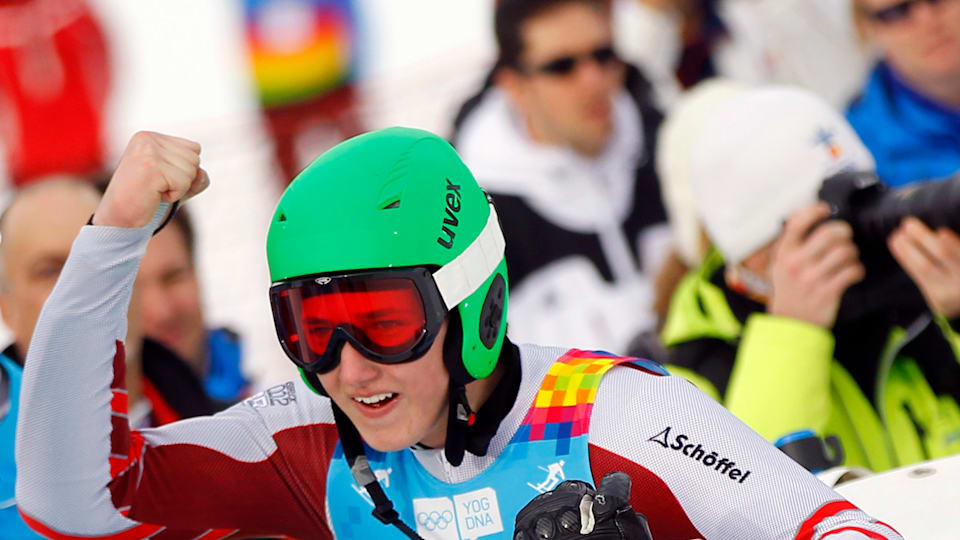Marco Schwarz: How the Winter Youth Olympics propelled my skiing career
Before suffering a crash that ended his 2023/24 season, the Austrian skier shared what he learned from his experience at Innsbruck 2012.

From being a gold medallist at the Winter Youth Olympic Games (YOG) to emerging as a contender for the most prestigious titles in alpine skiing.
Marco Schwarz has consistently elevated his performance since, over a decade ago, he won his first international races, and now stands out as one of the best all-rounders in the men’s FIS World Cup circuit.
Very few male skiers are able to excel in all four ski disciplines (slalom, giant slalom, super G, and downhill) and among them is the 28-year-old Austrian.
“I started last year with the speed events so there is a lot of potential, I guess. And yeah I’ll try my best to be better and better,” Schwarz told Olympics.com during the Atomic Media Day in October.
The Carinthian is embracing the new challenge, even if that entails a busier schedule: “I'm feeling really comfortable now with my skiing, with my body, and I’m feeling ready for a lot of races this year,” he added.
Schwarz's 2023/24 season came to an abrupt end following a crash in the Bormio downhill at the end of December, resulting in a serious knee injury while he was leading the overall World Cup standings.
But with the Gangwon 2024 Winter Youth Olympic Games (YOG) about to being in Republic of Korea, it's worth looking back at how the three-time YOG gold medallist has developed in the 12 years since Innsbruck 2012.
Learnings from Innsbruck 2012
The 2021 slalom globe winner became aware of his talent during the inaugural Youth Winter Olympics at Innsbruck 2012.
The then 16-year-old celebrated two individual gold medals (giant slalom and combined) and a team competition title in front of the home crowd at Patscherkofel, the very venue where Austrian ski legend Franz Klammer became Olympic downhill champion in 1976.
“I had a few really good races when I was younger, especially at Innsbruck 2012. That was the first time competing on an international level,” Schwarz remembered.
“That was pretty fun there. And then you have to work for your goals. You have to get better every year or trying to get better every year, to work hard. And the most important thing is to have fun in what you are doing. And I think I managed very well the transition from the juniors to the World Cup. I had always good coaches who would teach me a lot and now we're here!”
He went on to win two medals, including a gold, during the 2014 Junior World Championships in Jasna, Slovakia: “When I won the gold medal, probably that was the moment that I realised, 'yeah, I'm going to do this and I want to reach this.'”
After making his mark in the lower-tier FIS and Europe Cup circuits, Schwarz has firmly established himself in the World Cup, earning his first podium in the Madonna di Campiglio slalom at just 20 years old.
Marco Schwarz was leading the overall World Cup standings before suffering a season-ending injury at the Bormio downhill in December 2023.
A holistic approach
Since making his debut in elite skiing in 2014, the Austrian has continued to progress, claiming a slalom globe in 2021 and seven medals across four World Championships, including a gold in the combined event in Cortina.
Last season he showcased proficiency in both technical and speed disciplines by achieving impressive fourth- and sixth-place finishes at the Courchevel Worlds, respectively in downhill and super G.
The 28-year-old explained he worked hard during the summer to gain extra strength: “I really like physical training and I like pushing very heavy weights,” he said, without disclosing the exact amount.
“It depends on which part of the season you are, but that’s part of the game. You have to push really hard in some days.”
Describing his training regimen, he mentioned that interval training, involving "15 minutes full gas" followed by "10 minutes of rest, and then again," proves to be the most demanding.
In addition to physical exertion, the PyeongChang 2018 team gold medallist embraces technology to optimise his preparation.
He wears a special ring that tracks various biometrics, including sleeping patterns, heart rate, and body temperature. These data play a crucial role in shaping his training plan, especially during the summer when there are no disruptions from competitions: “I talk a lot with my physio and based on those values we make a good plan together,” he said.
His holistic approach also emphasises the importance of recovery: “When you don’t feel that good, you’re not going to push to the limit in the gym and you need to calm down a bit. That’s why I like going to a sauna to recover or take cold showers,” he said.
A quiet guy dealing with a celebrity status
Being an alpine skier in Austria comes with the territory of adapting to a certain level of celebrity status.
But how much does Schwarz enjoy being in the public eye?.
“I’m a pretty quiet guy,” he admitted.
“We're pretty lucky that ski in Austria is that big, but for sure sometimes it's good when you have some quiet time home and nobody is around.
“I like to be in the mountains when I have time. We have a small hut and I like spending time there with my family and friends, enjoying life.”
However, Schwarz is aware that there’s also a flip side in living in a country crazy for skiing:
“I like to have some privacy, that's for sure, but I mean, that's part of the game that people are going to recognise you on the streets. And when you have the home races like Schladming, Kitzbuhel, then it's pretty cool that there are that much people around!”
